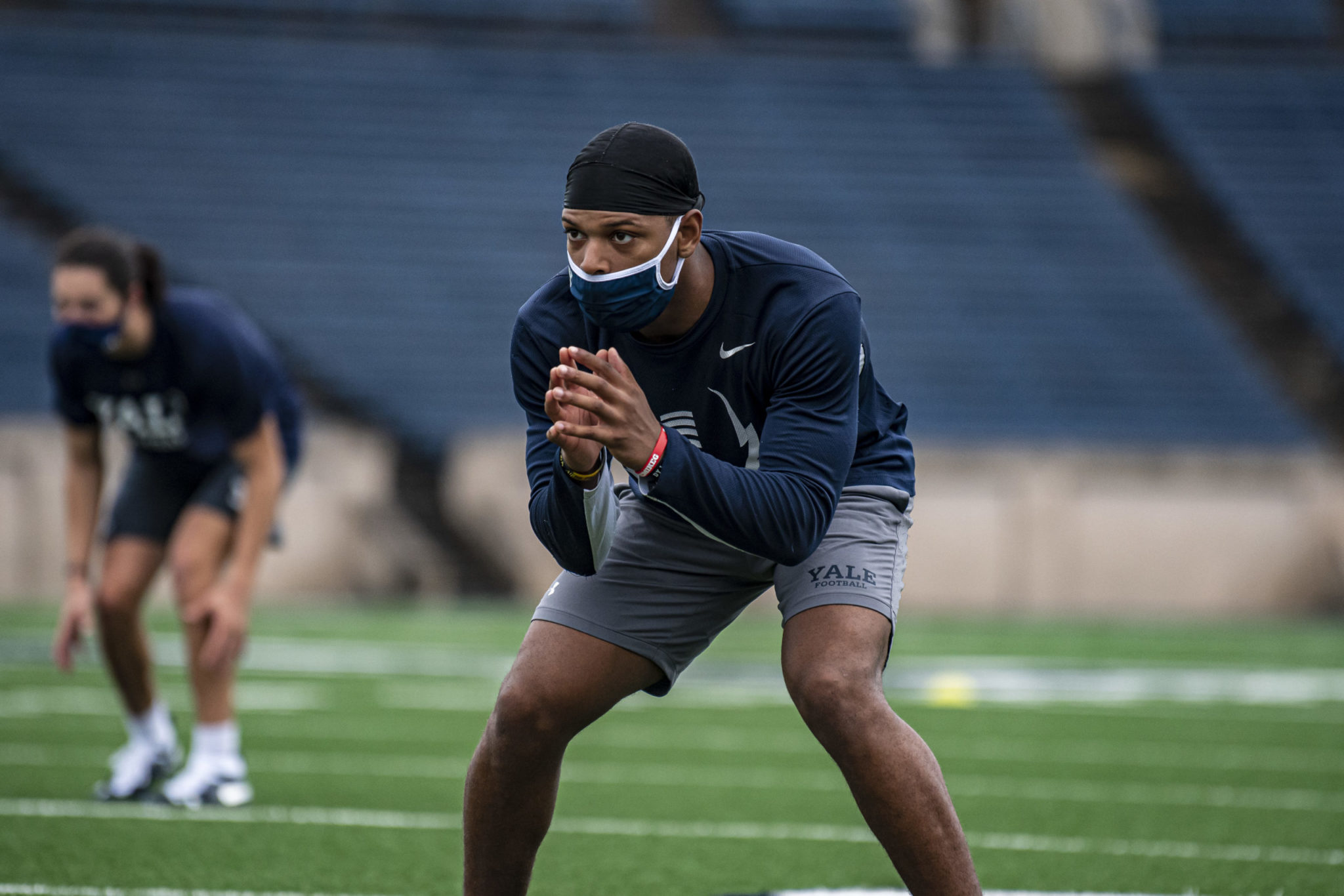FOOTBALL: ‘Focusing on the day-to-day’: Yale players work through spring practice
Yale players are using helmets more than they would during normal spring practices, as the team has returned to consistent training in Phase II after a season of inaction. Under head coach Tony Reno and players, the group’s mentality has revolved around the present and day-to-day progress.

Courtesy of Yale Athletics
Yale football players enrolled and living in New Haven are finishing up a spring of practices, as Yale fans and other Connecticut residents look forward to the relaunch of collegiate football games in the Elm City.
Even as some other Football Championship Subdivision schools play out delayed football seasons this spring, with no Ivy League competition this year, competitive football at Yale will not make a comeback until at least this upcoming fall. Players are currently engaged in a modified form of the spring training in which they usually participate. This year, with members of the team returning to football after a season of inaction, training has been more intense than previous spring semesters to prepare players for competitive play, as opposed to helping them recuperate from a long season.
For head coach Tony Reno and the entire Bulldog squad practicing this spring, their mental approach to practice remains as fixed as it was since Reno took the coaching reigns nearly a decade ago: “Be better than we were the day before.”
“Our emphasis right now has solely been on us,” Reno told the News. “This means that, for us to run our offense and defense effectively, we’ve focused heavily on the fundamentals of blocking, tackling on bags, catching the ball effectively, playing coverages effectively — all those things that you can’t do when you’re working on your own. Our overall goal is to be an elite program; you don’t get there by focusing on the end result, you get there by focusing on the day-to-day progress.”
Last semester, as both the Ancient Eight and NCAA sought to put together guidance for athletic training amid the pandemic, the Ivy League developed its phased practice approach. These regulations permitted Ivy League athletic teams to continue practices as long as training sessions were in accordance with institutional specifications around physical distancing and face covering requirements.
Last fall, Phase II was the earliest phase in which teams could be cleared for sport-specific activity — a phase in which Yale Athletics spent only six days.
This semester, changes were made to the Ivy League’s phased plan that, most notably, allowed sport-specific activities permissible in Phase I. This has led to marked differences in the training sessions Reno has carried out this spring, compared to what practices looked like just a few months ago.
After two weeks in Phase 0 and four weeks of Phase I activity to begin the semester, Yale Athletics advanced to Phase II in mid-March — a phase that teams have remained in for more than five continuous weeks.
“There are stark differences in what we’ve been doing in the spring compared to the fall,” Reno said. “We’re practicing with helmets and using footballs, which has allowed us to work a lot on individual skills and drills specific to positions. Even in years past under non-COVID situations, most of those spring drills would be done without the use of football helmets. These practices have really allowed players that have been away from the game for over a year to begin to ease their way back into it.”
While the difference between Phase I and II is not as noteworthy this semester as it was in the fall, given the new amendment to allow sport-specific training in the first phase, players have noted that Phase II practices have taken on a heightened level of intensity.
“Transitioning from Phase I to Phase II has allowed us to further develop our skills even more,” lineman Osorachukwu Ifesinachukwu ’23 said. “The practices themselves have been a lot more intense in Phase II, and supporting a healthy and safe Yale is a huge emphasis for our team right now.”
Reno described how the ability to have his team back in the flow of football-related activity has been indispensable to the players, especially in how it has conditioned them to play football in a “safer and more effective way.” He emphasized the confidence he has in the physical and mental state of his team, adding that they will be more than prepared to play competitive football this fall.
Linebacker and captain John Dean ’22 highlighted and praised the efforts made by the program’s medical team that have allowed practices to go on.
“A huge difference between the fall and the spring that I’ve seen is the consistency with which we are able to go out and practice,” Dean said. “The medical team, led by Dr. Elizabeth Gardner and head football athletic trainer Tom Rice, has done an amazing job helping us comply with all Yale safety measures to make sure we stay healthy, which in turn allows us to practice more frequently.”
One constant between both fall and spring practices has been the team’s efforts to virtually include players that are on a leave of absence into practices when feasible, according to both Reno and Dean. These players have the opportunity to participate in team meetings as well as the ability to stay involved in leadership and team-building activities.
“The emphasis of our program is always the present,” Dean said. “We have the goal in mind to be an elite program come fall, but we treat every single day like it’s the most important day in the history of our program.”
Yale’s last game of football was on Nov. 23, 2019, when the Bulldogs beat Harvard, 50-43, in double overtime.
Jared Fel | jared.fel@yale.edu









